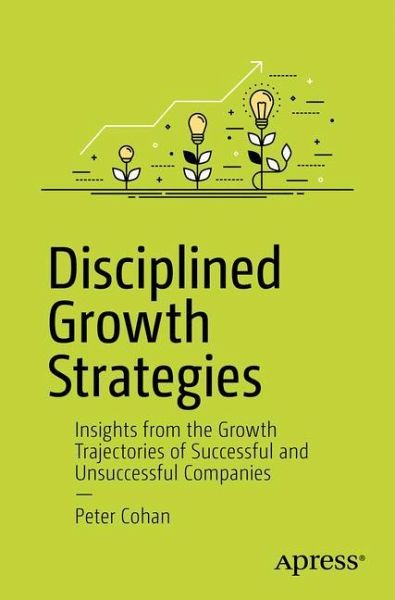
Disciplined Growth Strategies
Insights from the Growth Trajectories of Successful and Unsuccessful Companies

PAYBACK Punkte
23 °P sammeln!
Accelerate your company's growth in a disciplined fashion. This book provides leaders of large and small companies a proven comprehensive framework to think systematically about growth options and to yield practical strategies that produce faster growth.Drawing insights from case studies of successful and unsuccessful companies, strategy teacher and venture capitalist Peter Cohan models his systematic approach to brainstorming, evaluating, and implementing growth strategies across five dimensions: Customers, Geography, Products, Capabilities, Culture. He examines each of these five growth dime...
Accelerate your company's growth in a disciplined fashion. This book provides leaders of large and small companies a proven comprehensive framework to think systematically about growth options and to yield practical strategies that produce faster growth.
Drawing insights from case studies of successful and unsuccessful companies, strategy teacher and venture capitalist Peter Cohan models his systematic approach to brainstorming, evaluating, and implementing growth strategies across five dimensions: Customers, Geography, Products, Capabilities, Culture. He examines each of these five growth dimensions in turn, selecting and organizing his cases to compare the growth strategies deployed successfully and unsuccessfully by large and small companies along the given dimension. In each of his five dimensional chapters, the author derives from his case analyses the key principles and processes for creating and achieving faster growth.
Professor Cohan draws on a network of hundreds of founders, CEOs, and investors developed through his decades of consulting, authorship of 11 books, and over five years as a Forbes columnist. He shows through many compelling stories how leaders craft effective growth strategies.
Business leaders will learn the following lessons from this book:
Achieving rapid but sustainable growth is a business leader's most important responsibility - and leaders must approach this challenge with a mixture of vision, intellectual humility, and a willingness to experiment and learn from failure.
The growth challenges facing companies that are currently growing quickly differ from the ones that stagnating or shrinking companies must overcome.
Companies can achieve growth along one or more of the dimensions simultaneously - and they often expand geographically to customers in the same segments.
Usefulinsights can emerge from comparing case studies of successful and unsuccessful companies pursuing similar growth strategies.
Companies should select a growth strategy based on three factors: the attractiveness of the growth opportunity, the company's capabilities to provide superior value to customers in the selected market, and the expected return on investment in the growth vector.
Companies should select a growth strategy that best fits their capabilities and culture and they must enhance both to adapt to new growth opportunities.
Who This Book Is For
The people in companies who are responsible for growth: chief executive officers, chief marketing officers, chief product officers, heads of business development, product managers, sales people, and human resources managers
Drawing insights from case studies of successful and unsuccessful companies, strategy teacher and venture capitalist Peter Cohan models his systematic approach to brainstorming, evaluating, and implementing growth strategies across five dimensions: Customers, Geography, Products, Capabilities, Culture. He examines each of these five growth dimensions in turn, selecting and organizing his cases to compare the growth strategies deployed successfully and unsuccessfully by large and small companies along the given dimension. In each of his five dimensional chapters, the author derives from his case analyses the key principles and processes for creating and achieving faster growth.
Professor Cohan draws on a network of hundreds of founders, CEOs, and investors developed through his decades of consulting, authorship of 11 books, and over five years as a Forbes columnist. He shows through many compelling stories how leaders craft effective growth strategies.
Business leaders will learn the following lessons from this book:
Achieving rapid but sustainable growth is a business leader's most important responsibility - and leaders must approach this challenge with a mixture of vision, intellectual humility, and a willingness to experiment and learn from failure.
The growth challenges facing companies that are currently growing quickly differ from the ones that stagnating or shrinking companies must overcome.
Companies can achieve growth along one or more of the dimensions simultaneously - and they often expand geographically to customers in the same segments.
Usefulinsights can emerge from comparing case studies of successful and unsuccessful companies pursuing similar growth strategies.
Companies should select a growth strategy based on three factors: the attractiveness of the growth opportunity, the company's capabilities to provide superior value to customers in the selected market, and the expected return on investment in the growth vector.
Companies should select a growth strategy that best fits their capabilities and culture and they must enhance both to adapt to new growth opportunities.
Who This Book Is For
The people in companies who are responsible for growth: chief executive officers, chief marketing officers, chief product officers, heads of business development, product managers, sales people, and human resources managers














